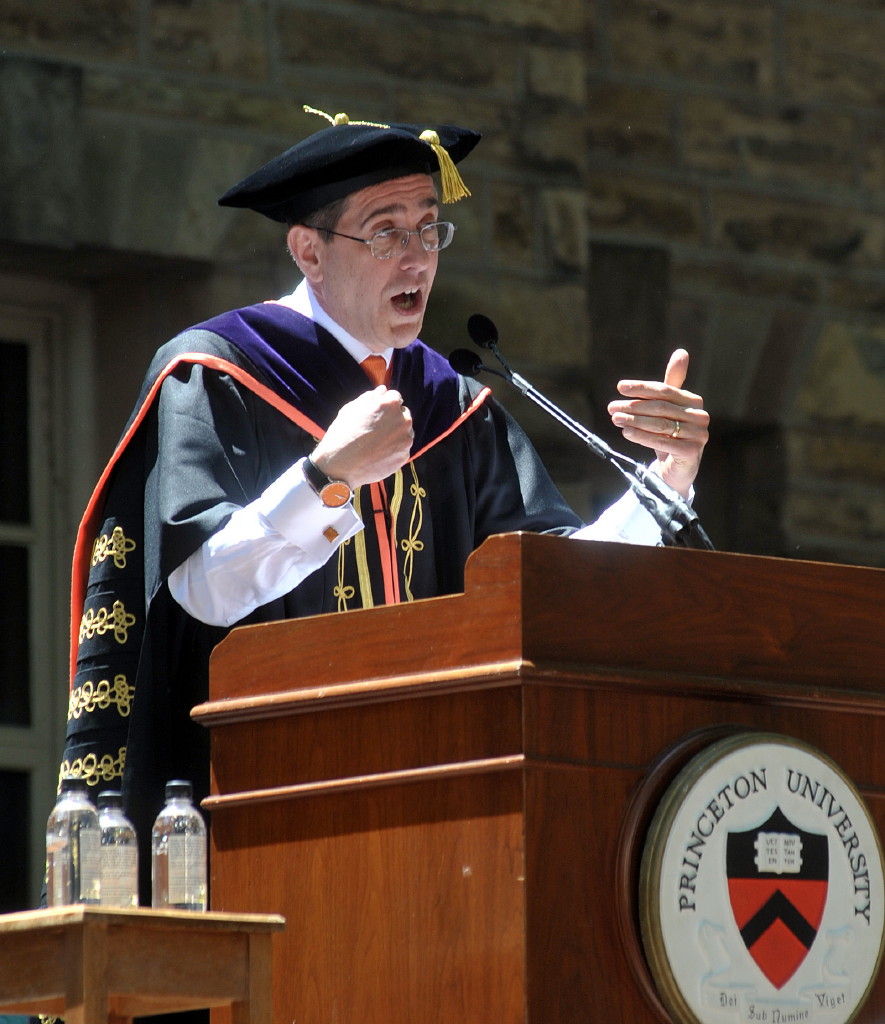Princeton University President Christopher L. Eisgruber told graduating students on June 5 their investment in a college education was worth it and said more people should go to college.
Eisgruber, speaking from in front of Nassau Hall for the 271st commencement in school history, used his remarks to return to a familiar theme he has expressed often during his presidency, now nearing its fifth anniversary. Dressed in his academic robe, Eisgruber said research shows going to college is a good financial investment.
“A college education is a long-term investment,” he said on a day when the university awarded 1,281 degrees to the class of 2018 and 563 graduate degrees. “It enables graduates to develop and adapt, and it pays off spectacularly in the long run. The idea that we would be better off with fewer college graduates is a short-term swindle, a swindle that would cheat America’s young people, weaken the nation’s economy and undermine our future.”
He urged support for the nation’s public colleges and universities, “a national treasure” that he said are being underfunded by state lawmakers.
“America depends on its public colleges and universities,” he said. “They are engines of social mobility and innovation.”
Along those lines, the university honored with an honorary degree Barbara Gitenstein, president of The College of New Jersey, Ewing, during the ceremony. Eisgruber lauded Gitenstein for increasing the four-year-graduation rate at TCNJ from 58 percent to 75 percent.
In his remarks, Eisgruber touched on different arguments against going to college, such as a vocational career making more sense or the issue of student debt.
“Still, if pundits and politicians were saying only that America needs better vocational training, I could agree wholeheartedly,” he said. “It would be terrific if more people could get the training they need to practice a trade. But at the same time, it would also be great if more people, not fewer, could receive the extraordinary benefits that come with a college degree.”
Eisgruber later pivoted to student debt, where the Federal Reserve reported in May that college loan debt stood at $1.52 trillon.
But Eisgruber said the highest rate of defaulting on student loans is by college drop-outs who “never get the earnings boost that comes with a degree.”
Princeton has boasted of its financial aid program, where the cost of attending as an undergraduate for 2018-19 will be $65,810 for tuition, room and board.
The university has said 60 percent of all undergraduates are on some form of financial aid, and that for families with an annual income of $65,000 or less, the aid package covers full tuition and room and board.
In his speech, Eisgruber touted how the class of 2018 was the most socioeconomically diverse in the history of a university that was founded in 1746.
“At Princeton, we believe in socioeconomic diversity because we know that to achieve excellence as a university and as a nation, we must draw talent from every sector of society,” he said. “If we want to heal the divisions that inequality has produced in this country, we must ensure that students from low-income backgrounds receive the educations they need to develop their abilities and contribute to our society.”
In July, Eisgruber, 56, will mark his five-year-anniversary as the 20th president in Princeton’s history. A 1983 graduate of Princeton, he was chosen in 2013 to lead his alma mater.
From the earliest days of his administration, he has often used his public remarks to stress the importance of a college degree – a theme he expressed in his inauguration address.
“Yet here at home, we see a parade of reporters, politicians and pundits asking whether a college education is worth it, even though the economic evidence for the value of a college education is utterly overwhelming,” he said five years ago in remarks similar to the ones he gave at commencement.

